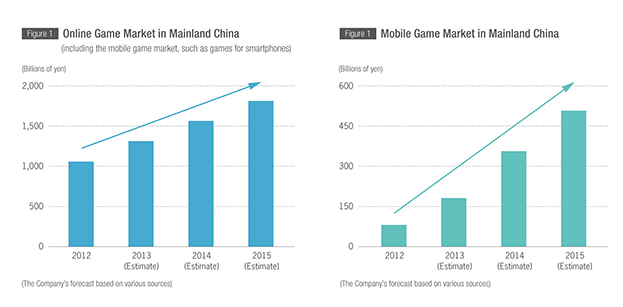2) Smart Devices as Game Consoles
Smart devices such as smartphones and tablets are not game consoles. However, smart devices have rapidly spread to gain an important position as a type of gaming device. It has become a common sight to see people playing games on these devices, which leads us to a strategically important theme of how to encourage customers to play our content on smart devices. Based on this understanding, we have focused our methods for accelerating game development and services for smart devices during the fiscal year ended March 2014. Our efforts have been producing noticeable results such as big hits of “DRAGON QUEST MONSTERS SUPER LIGHT” and “SCHOOLGIRL STRIKERS” since the second half of this fiscal year. While our Japanese studios have been taking a lead in this area, Square Enix Montréal, a studio specializing in game development for smart devices, launched a game called “Hitman GO” in April, which was highly acclaimed around the world. It hasn’t proved to be a major hit yet, but I think it is a significant achievement in that the originality of its gameplay and art style won high praise. We are working hard to connect this achievement to future big hits in Europe and North America. The global market for smart device games is showing remarkable growth, and the growth of the Asian market, centered on mainland China, deserves special mention (see Figure 1 ). In the fiscal year ended March 2014, we released “Kaku-San-Sei Million Arthur” for Korea, Taiwan and mainland China, and achieved satisfactory results. In addition, while it is not a game for smart devices, “FINAL FANTASY XIV” was successfully launched in Japan, North America and Europe last August, and won high acclaim worldwide. This summer, the service territory for the MMO game has expanded to mainland China with the intent of entering the Chinese market on a full-scale basis, and we will also work to further grow our revenues from the Asian market by actively releasing mobile titles such as “Sangokushi Ranbu.” Asia isn’t the only region to demonstrate remarkable growth. The Indian and South American game markets are also growing at astounding rates, and smart device games hold the key to capturing these growth markets. It’s quite true that, as the economies of developing regions grow, demands for entertainment grow as well. In such regions, people use smartphones or tablets as the device for enjoying entertainment content. Making our content available on these devices will create huge business opportunities for us. We shall establish a foothold of entry into those fast-growing markets through the fiscal year ending March 2015.

3) Product Portfolios Tailored to Regions
Our conventional product sales strategy has been to sell one product worldwide, and we have been developing games for the global market. However, each region holds different cultures and lifestyles, and our customers in those regions have different tastes in games and playing styles. In addition, the gaming environment has become diversified; various options are offered from conventional special-purpose game consoles to smart devices, and other general-purpose devices to cloud streaming. Alongside this trend, the process of game development and distribution are also expanding at an exponential rate. The series of activities in the games business process—procure funding, prepare the development environment, develop games, distribute and sell the finished games—has previously been possible only for major publishers with large-scale funding. However, the shift to “open source, low-cost game development tools,” “fundraising through crowd funding” and “direct sales via download” have created an ecosystem in which large-scale funding is no longer necessary. This has created a situation where independent developers are appearing one after another, and a large number of new games are being produced all over the world. As seen above, not only the gaming environments, but also the games themselves are increasingly becoming more diverse and decentralized on a world-wide basis, and we therefore recognize that it has become difficult to simply lump the game market together under the term “global.”
